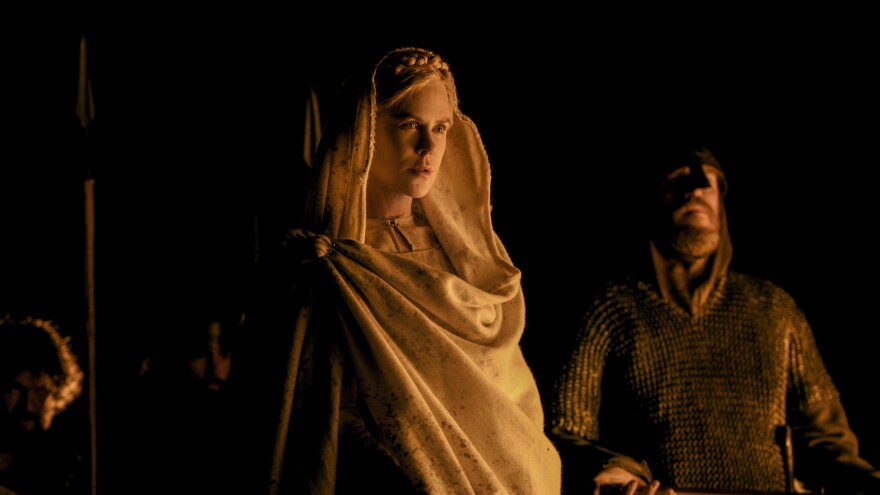"I will avenge you, Father; I will save you, Mother; I will kill you, Fjölnir."
These are the words that young Viking prince Amleth (Oscar Novak, as a boy, Alexander Skarsgård, as a man) mutters to himself repeatedly — a tripartite vow to himself to return to the kingdom from which he fled after his evil uncle, Fjölnir, murdered his father the King and married his mother the Queen.
Something is rotten in the fictional island kingdom of Hrafnsey, in other words. The Northman doesn't so much adopt the plot of Hamlet as dig beneath it to unearth the ur-story that predates Shakespeare by centuries. So while the tale's broad strokes are familiar, its particulars can vary in intriguing ways.
As played with feral, foaming rage by a sinewy Skarsgård, for example, Amleth is no dithering Dane who chooses to procrastinate from the bloody task before him by flouncing around a castle, mumbling existential monologues to himself. No, this guy joins up with a band of berserkers who deck themselves out in wolf-pelt drag and pillage settlements throughout Eastern Europe. Like Hamlet, however, Amleth forgets himself, getting so caught up in his life of murder (and, from the available evidence, in his Crossfit routine) that he gets remonstrated by an otherworldly Seeress (Björk, somehow inevitably) who reminds him of his vow.
There's a ruthless efficiency to Robert Eggers' third feature, which tamps down the director's surreal, experimental sensibility — or at least, cordons it off from the main action and shunts it into the realm of dreams, visions and fevers; it's a surprisingly conventional storytelling choice from such an unconventional director.
The story, co-written by Eggers and the Icelandic poet Sjón, is in fact so straightforward and familiar that you might find yourself, as I did, growing impatient for those moments of the fantastic and otherworldly, for the gods and monsters of Viking culture to insert themselves into the proceedings. Whenever they do, it's thrilling, as Eggers is a deft hand at letting one world bleed into the other.

When revenge drives the plot, it can't help but imbue the proceedings with a satisfying pulpiness, which is probably why The Northman, for all its vaunted, assiduous attention to historical accuracy, somehow ends up having so much of Conan the Barbarian and Assassin's Creed Valhalla to it. That's not meant to disparage Eggers' film — both Conan and ACV deliver on their premises. But where, for example, the actors in The Witch spoke period-appropriate Early Modern English dialogue, the characters of The Northman speak English inflected with vaguely Scandinavian consonants ("Neverrr enterrr my bedchamberrrrr without knockinggg-ga!"), which can't help but admit some small amount of cheesiness to the mix.
There are, amid all the starkly beautiful landscapes and the starkly brutal violence, a handful of small, human touches that help keep things emotionally grounded. Anya Taylor-Joy plays Olga, Amleth's ally and love-interest, as someone far more wise about the ways of the heart than he could ever hope to be, which sets up one of the film's nicer twists. Claes Bang gets to shade the evil, usurping Fjölnir with more emotional layers as he ages.
Ultimately, The Northman may have less to say about the nature of violence, and the perverse traps that simplistic notions of masculinity and honor lay for the soul, than last year's similarly evocative medieval meditation The Green Knight. But that David Lowery film set out to be something that audiences grappled with and argued over.
I get the sense that Eggers' goal here is a simpler, more direct one — to interpret a very old story anew, to deliver the narrative goods (betrayal, murder, revenge, redemption) with the help of his largest budget yet, and to let Björk be Björk, in all her sublime Björkiness. In this, The Northman delivers.
Copyright 2022 NPR. To see more, visit https://www.npr.org. 9(MDAwMTM1NDgzMDEyMzg2MDcwMzJjODJiYQ004))



